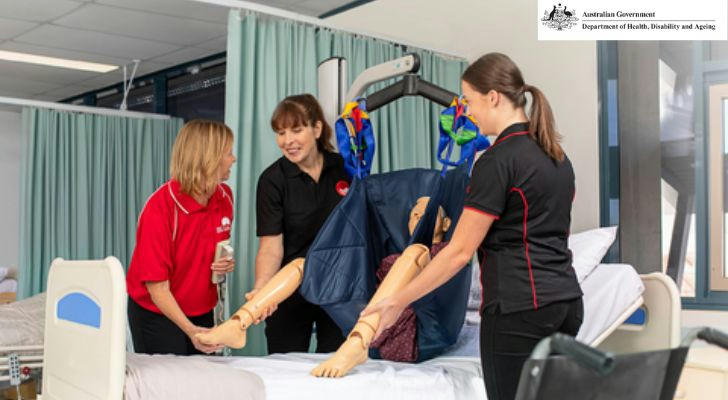Australia Government-Supported Disability Care Training Programs for 2025
📢 Official Certification | High-Paying Career Opportunities | Government-Supported Training
Australia actively supports government-supported disability care training, providing opportunities for adults who have left formal education as well as immigrants and temporary residents to enter the disability care industry. By choosing the Certificate III in Individual Support (Disability), learners not only obtain official certification but also secure access to a stable and high-demand job market.

💥 Advantages and Challenges of Disability Care Training
🔹 Advantages
- Strong industry demand: According to JobOutlook, disability care roles in Australia are projected to grow significantly over the next five years.
- Government-supported courses: Learners can enroll in Certificate III in Individual Support (Disability) through TAFE or other registered training organizations (RTOs).
- Career stability and development: Disability care positions are less susceptible to automation, providing a clear pathway from entry-level support roles to supervisory positions.
🔹 Potential Challenges
- High competition for courses: Major cities like Sydney and Melbourne have limited enrollment spots.
- Solution: Choosing regional TAFE providers or flexible course options can improve admission chances.
🌐 Flexible Online and On-Site Learning
- Courses can be completed alongside full-time or part-time work, suitable for adults seeking a career change.
- Online platforms offer video lessons, remote tutoring, and assessments for flexible learning.
- Some courses combine online theory with on-site practical placements, ensuring balanced theoretical and hands-on training.
🏥 Practical Training and Official Certification
- Mandatory practical placement: Most programs require 120–160 hours of clinical practice in disability care settings, giving learners real-world experience.
- Official certification: Graduates receive nationally recognized qualifications from RTOs or TAFE.
💡 Qualification Pathways
- Entry-level → Certificate III in Individual Support (Disability)
- Advanced pathway → Certificate IV in Disability Support

📝 Step-by-Step Certification Process
Step 1 – Confirm Eligibility
- Age: 17 years or older
- Education: Completion of Year 10 or equivalent
- Visa status: Australian permanent residents (PR) eligible; some temporary visa holders (e.g., 485, 482) may qualify
- Background checks: National Police Check and NDIS Worker Screening
- Health requirements: COVID-19 and influenza vaccinations
- English proficiency: Non-native speakers typically require IELTS 5.5 or equivalent
Step 2 – Enroll in a Training Program
Choose a registered training organization, e.g., TAFE NSW Disability Care Program, or other state-approved providers.
Step 3 – Complete Theory and Practical Training
- Online or face-to-face theory modules
- 120–160 hours of practical placement in disability care facilities or community settings
Step 4 – Obtain Official Certification
Upon successful completion, learners receive the CHC33021 Certificate III in Individual Support (Disability).
Step 5 – Employment and Career Progression
Certified graduates can pursue roles such as Disability Support Worker, Personal Care Assistant, or Community Support Worker. Further study (Certificate IV or Diploma) enables higher-paying or supervisory positions.
🔍 Finding the Right Disability Care Course
- TAFE official websites: e.g., TAFE NSW
- Government resources: Health.gov.au – Disability Services
- Job platforms: Seek, Indeed, and other job portals regularly list disability care positions in Australia
📈 Career Prospects and Labour Demand
- Projected employment growth: Over 25% increase in the next five years
- Long-term stability: Demand driven by population aging and increased need for disability support
- High regional demand: Rural and remote areas have significant workforce shortages
🏢 Job Roles, Work Environment, and Salary Insights
| Role | Average Pay | Suitable Candidates |
|---|---|---|
| Disability Care Worker | AUD 30–35/hour | 30–60-year-old career changers, immigrants, temporary visa holders |
| Personal Care Assistant | AUD 36–38/hour | Individuals seeking home or community care positions |
| Senior Disability Support Worker | AUD 70,000–80,000/year | Candidates targeting management or specialized roles |
✅ Conclusion
Australian government-supported disability care training provides adults and immigrants with a stable, in-demand career pathway. Through official certification and practical placements, learners gain hands-on skills and professional recognition, ensuring long-term career growth in a sector with high workforce demand.

